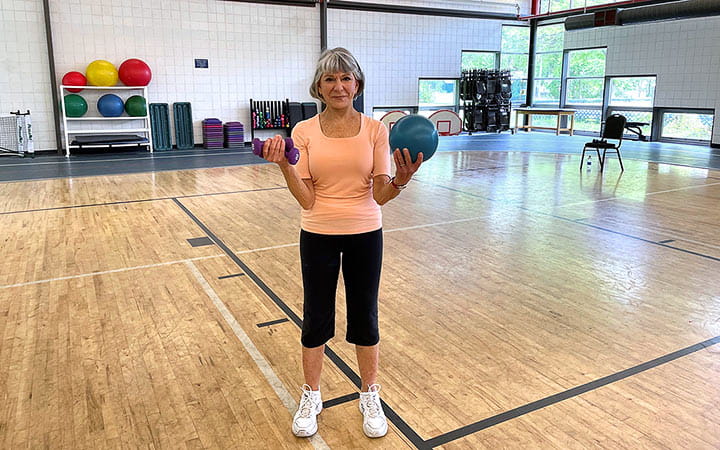Innovative Approach To Bladder Cancer Offers Promise of an Active Life
May 27, 2021

Bladder cancer was no match for 80-year-old aerobics instructor Rosie Daniels. Diagnosed while balancing a busy schedule officiating swim meets and teaching four classes per week, she didn’t have any patience for a bag collecting urine outside her body.
The Bay Village woman instead opted for the Indiana Pouch, an innovative urological procedure offered at University Hospitals. The bladder is removed and a new pouch to contain urine is fashioned out of the patient’s large and small intestines. Several times per day, the patient empties the pouch with a catheter, which only takes a few minutes.
It’s a good thing it doesn’t take long, because this master gardener, golfer and exercise instructor doesn’t have time to waste. University Hospitals Seidman Cancer Center had the expertise to get Rosie up and moving again.
“Muscle-invasive bladder cancer is a disease that is very aggressive and normally treated with surgery to remove the bladder,” says surgical oncologist Adam Calaway, MD, of the UH Urology Institute, who trained with some of the surgeons who pioneered this approach Indiana University School of Medicine. “This is a very big surgery, and she flew through it even with her age. The Indiana Pouch is probably only done in 5 percent of patients because of the complexity of creating it and managing it.”
Feisty Rosie, mother of two, grandmother of three and instructor of many, had a thing or two to teach her body. She was more than up to this surprise test, following a cancer diagnosis whose only signs were sudden blood in her urine.
As with any abdominal surgery, Rosie spent a few weeks doing physical therapy to work through the discomfort of gas pressure. She had to walk a lot to help her system adjust to moving again, and teach her new bladder how to respond to her kidneys. Rosie carries catheter tubing discreetly in her purse to empty the pouch up to six times per day through a small stoma next to her belly button.
“Your brain talks to your bladder, but your brain doesn’t talk to your small intestine,” Dr. Calaway says. “You have to teach the new bladder.” And, Rosie reports, “I taught it!”
Rosie says she probably goes to the bathroom less frequently than most people her age. She gets through seven hours of sleep without needing to awaken and empty the pouch. Within a few months, she was teaching again. She was even able to swim, since her stoma has a natural valve and only requires a small Band-Aid.
“Rosie is truly a remarkable woman,” says Dr. Calaway, who recently attended one of the vigorous workouts led by Rosie at the West Shore YMCA. “She is back to doing all her favorite activities without restrictions, loving life and cancer-free.”
Rosie could not be more pleased.
“I don’t know how 80 is supposed to feel, but I feel great!” she declares.
Tags: Bladder Cancer, Cancer


